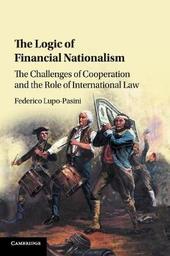
|
The Logic of Financial Nationalism: The Challenges of Cooperation and the Role of International Law
Paperback / softback
Main Details
| Title |
The Logic of Financial Nationalism: The Challenges of Cooperation and the Role of International Law
|
| Authors and Contributors |
By (author) Federico Lupo-Pasini
|
| Physical Properties |
| Format:Paperback / softback | | Pages:308 | | Dimensions(mm): Height 229,Width 149 |
|
| Category/Genre | International finance |
|---|
| ISBN/Barcode |
9781316638767
|
| Classifications | Dewey:346.082 |
|---|
| Audience | | Tertiary Education (US: College) | | Professional & Vocational | |
|---|
| Illustrations |
Worked examples or Exercises
|
|
Publishing Details |
| Publisher |
Cambridge University Press
|
| Imprint |
Cambridge University Press
|
| Publication Date |
13 December 2018 |
| Publication Country |
United Kingdom
|
Description
Using case studies ranging from cross-border bank resolution to sovereign debt, the author analyzes the role of international law in protecting financial sovereignty, and the risks for the global financial system posed by the lack of international cooperation. Despite the post-crisis reforms, the global financial system is still mainly based on a logic of financial nationalism. International financial law plays a major role in this regard as it still focuses more on the protection of national interests rather than the promotion of global objectives. This is an inefficient approach because it encourages bad domestic governance and reduces capital mobility. In this analysis, Lupo-Pasini discusses some of the alternatives (such as the European Banking Union, Regulatory Passports, and international financial courts), and offers a new vision for the role of international law in maintaining and fostering global financial stability. In doing so, he fills a void in the law and economics literature, and puts forward a solution to tackle the problems of international cooperation in finance based on the use of international law.
Author Biography
Federico Lupo-Pasini is a lecturer in international business and finance law at Queen's University Belfast School of Law. He studied at the World Trade Institute and at the National University of Singapore, and previously worked at the University of New South Wales. He has been published in numerous journals in the field of international economic law, and he has served as a consultant on international finance and international trade law for the Asian Development Bank, the EU, and various governments in Asia.
Reviews'The book is enjoyable and well written, demonstrating the author's expertise on the topic, and combining legal theory with the analysis of practical case studies.' Lucia Satragno, Global Policy
|